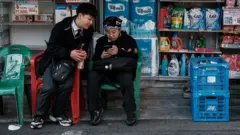South Korea has passed a bill banning the use of mobile phones and smart devices during class hours in schools - becoming the latest country to restrict phone use among children and teens.
The law, which comes into effect from the next school year in March 2026, is the result of a bi-partisan effort to curb smartphone addiction, as more research points to its harmful effects.
Lawmakers, parents, and teachers argue that smartphone use is affecting students' academic performance and taking away time they could have spent studying.
The ban has its skeptics, including students who question how it would work, its wider implications, and whether it is addressing the root cause of addiction.
The bill passed convincingly on Wednesday afternoon, with 115 votes in favor out of 163 members present. Most South Korean schools have already implemented some form of smartphone ban. Some countries like Finland and France have banned phones on a smaller scale, applying the restriction only to schools for younger children. Others like Italy, the Netherlands, and China have restricted phone use in all schools.
But South Korea is among the few to enshrine such a ban in law. Children today “just can’t seem to put their smartphones down,” says Choi Eun-young, mother of a 14-year-old in Seoul. According to a 2024 government survey, nearly a quarter of the country’s 51 million people depend on their phones excessively, and this figure more than doubles to 43% for those aged 10 to 19.
Moreover, more than a third of teens report struggling to control their time spent on social media, leading to parental concerns about the impact on their children's productivity and social interactions.
Cho Jung-hun, an opposition lawmaker who introduced the bill, emphasized significant scientific evidence indicating that smartphone addiction adversely affects students' emotional and cognitive development.
The new law will provide teachers with better authority to manage smartphone usage in classrooms while also mandating that schools educate students about the proper use of technology. Some exemptions will remain in place, such as for students with special educational needs.
While the conservative Korean Federation of Teachers' Association supports the ban, concerns remain among the Korean Teachers and Educational Workers' Union regarding potential infringements on students' rights.
"In the current reality, students have no place to meet friends outside of cram schools except through KakaoTalk or Instagram," says teacher Cho Young-sun, advocating for deeper conversations about the challenges impacting students beyond just phone usage.


















